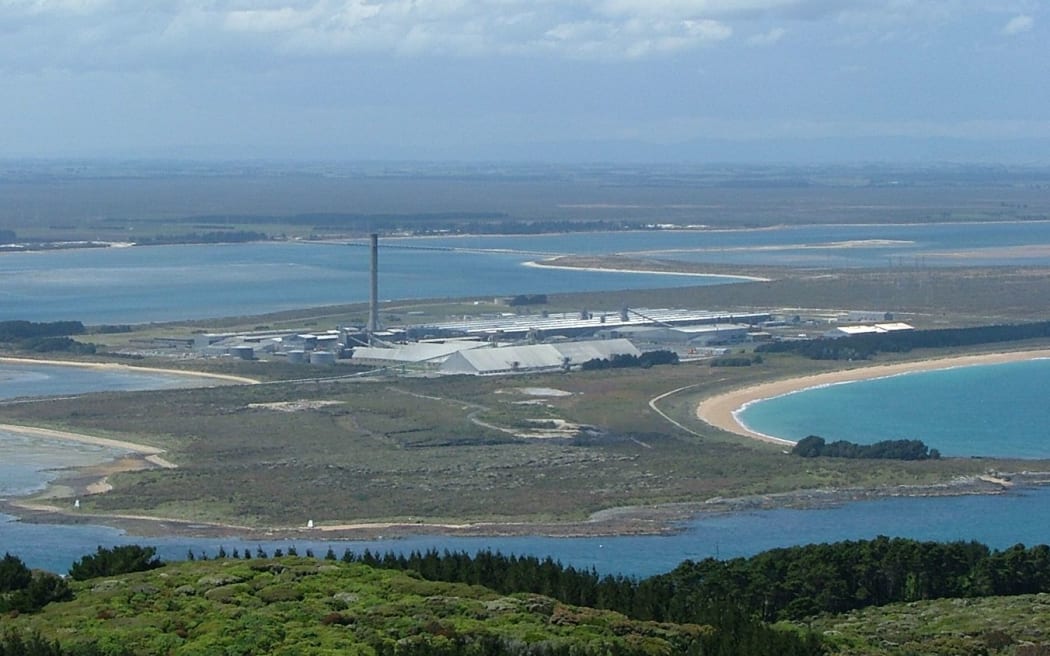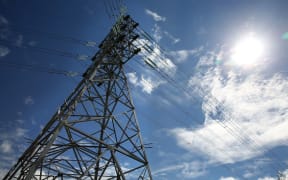An electricity analyst and consumer advocate says a new pricing system proposed for the national grid would slash the power bill of Southland's aluminium smelter by $50 million a year and put Northland power bills up ten percent.
The Electricity Authority is reviewing the system Transpower uses to charge out its transmission costs to power companies.

Tiwai Point smelter Photo: Wiki Commons
Its stated goal is a more efficient and durable way of allocating the costs of running the national grid, and it's just had a record 88 submissions on its proposed options for doing that.
But Molly Melhuish of the Domestic Energy Users Networks said the proposals favoured industry at the expense of domestic consumers and the struggling regions.
She said the changes the authority was looking at would load costs on households, while slashing the power bills of major users, like the Tiwai Point smelter.
"Under this methodology, the smelter benefits by $50 million a year," she said, whereas the much-hated government subsidy to the smelter was a one-off $30m.
"And that is an absolute outrage. "
Electricity Authority chief executive Carl Hansen said the $50m a year reduction in the smelter's costs could happen under one of the charging options it has suggested.
But he said there were other options that did not include a benefit for the smelter, and the Authority had not yet decided which combination it prefers.
"The current transmission pricing method, the vast bulk of (the cost) actually just spreads the cost like Marmite, across everybody, across the country," he said.
"And it doesn't relate to who's causing the costs, or who's benefiting from the grid, or who's using parts of it. "
Northland power companies believe the danger of a non-Marmite approach - i.e. not spreading the costs - is that remote, sparsely populated areas are hit with charges their consumers can't afford.
Top Energy said under one model the Authority was suggesting transmission costs in the Far North would go from $3m to $13m.
Chief executive Russell Shaw said if that happened, it would be cheaper for Top Energy to build its own network connection to the national grid and bypass Transpower altogether .
"A new line for us to connect the whole Top Energy network into Northpower's network is about $26m. That's about 2 years of the proposed charges, " he said.
"It just can't be right if we can build a new line next to the existing one and that's cheaper. But if the proposals come through as they stand, that would be one of the courses of action we would look to take."
Mr Shaw said the Electricity Authority had also greatly overestimated the amount of electricity the Far North would consume, which gave little cause for confidence in its processes.
"They've estimated Top Energy's consumers' demand is about 660 megawatts," he said. "That's about 25 megawatts greater than the aluminium smelter at Tiwai.
"Our actual maximum demand is 65 megawatts, so just 10 per cent of what they've calculated."
The general manager of Northpower in Whangarei, Graham Dawson, said under the proposals Northland would be paying for Transpower infrastructure that has been needed only because of Auckland's growth.
"You've got the the 400,000 volt line going from the centre of the North Island to Auckland, and another project which is really bypassing around Auckland to feed the northern part and Northland.
"Some of those increased costs would be just about the growth in Auckland which we think is entirely unfair."
Northland's economic development agency, Northland Inc, has told the authority a ten percent price hike would devastate business in the region.
Chief executive David Wilson said a 10 percent rise in power prices would scare off potential investors and undermine the government's vision for reviving the regional economy.
"It seems ironic that we're working with central government on a regional growth study and an economic action plan which we're just at the moment in the throes of completing, and then this comes in from left-field, saying if you want your businesses to grow they're going to have to pay more for their energy. It's silly," he said.
Mr Hansen said the Electricity Authority would take on board all the feedback but said it had to come up with a charging formula for Transpower that delivered the best productivity, and the best prices for the country overall.
He said the Authority would begin a new round of consultation once it had firmed up its preferred pricing methodology, later this year.



